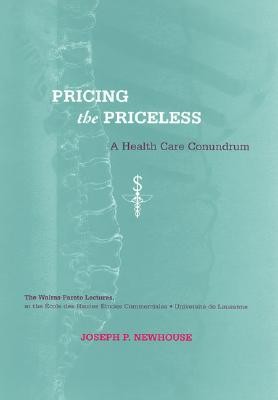| Pricing the Priceless: A Health Care Conundrum Contributor(s): Newhouse, Joseph P. (Author) |
|
 |
ISBN: 0262640589 ISBN-13: 9780262640589 Publisher: MIT Press OUR PRICE: $29.70 Product Type: Paperback - Other Formats Published: August 2004 Annotation: The health care industry differs from most other industries in that medical pricing is primarily administered by the government and private insurers and in that it uses several types of contracts. Providers may receive a fixed sum for all necessary services within a given period of time, for the necessary services to treat a given condition, or for each specific service. The industry is changing dramatically, offering many natural experiments to aid understanding of the economics of pricing for health care. In "Pricing the Priceless," Joseph Newhouse explains the different pricing systems and how they affect resource allocation and efficiency, focusing on the efficiency of pricing. He also discusses larger issues of equity, fair distribution of burden, and social justice. Although most of the examples are American-based, the same issues arise in all medical care financing and delivery systems, and the theories and models are general enough to apply to many institutional contexts. The topics include Medicare, managed care, the contemporary integration of health insurance and medical care, the management of moral hazard and stinting, uncertainty and risk aversion, the demand for health insurance, agency relationships, information disparities, regulation, and supply-side and demand-side selection. |
| Additional Information |
| BISAC Categories: - Business & Economics | Insurance - Health - Business & Economics | Industries - General - Business & Economics | Economics - General |
| Dewey: 338.433 |
| LCCN: 2002024407 |
| Series: Walras-Pareto Lectures |
| Physical Information: 0.54" H x 5.68" W x 8.62" (0.77 lbs) 266 pages |
| Descriptions, Reviews, Etc. |
| Publisher Description: The health care industry differs from most other industries in that medical pricing is primarily administered by the government and private insurers and in that it uses several types of contracts. Providers may receive a fixed sum for all necessary services within a given period of time, for the necessary services to treat a given condition, or for each specific service. The industry is changing dramatically, offering many natural experiments to aid understanding of the economics of pricing for health care. In Pricing the Priceless, Joseph Newhouse explains the different pricing systems and how they affect resource allocation and efficiency, focusing on the efficiency of pricing. He also discusses larger issues of equity, fair distribution of burden, and social justice. Although most of the examples are American-based, the same issues arise in all medical care financing and delivery systems, and the theories and models are general enough to apply to many institutional contexts. The topics include Medicare, managed care, the contemporary integration of health insurance and medical care, the management of moral hazard and stinting, uncertainty and risk aversion, the demand for health insurance, agency relationships, information disparities, regulation, and supply-side and demand-side selection. |
Contributor Bio(s): Newhouse, Joseph P.: - Joseph P. Newhouse is John D. MacArthur Professor of Health Policy and Management at Harvard University and Director of the Division of Health Policy Research and Education. He is the founding editor of the Journal of Health Economics. |